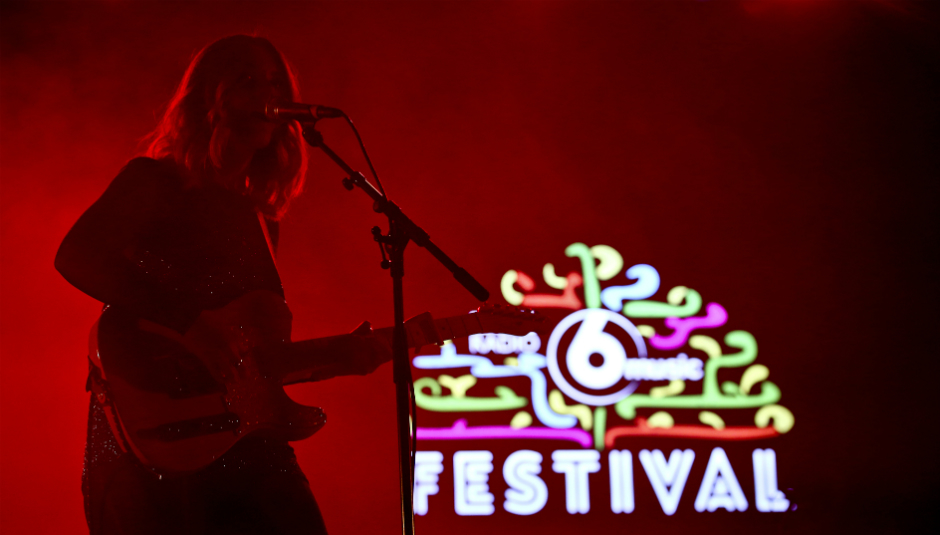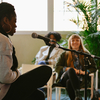Entering its 4th year, BBC's 6 Music Festival has been largely considered a rip-roaring success not only for its stellar line-ups but also, importantly, for visiting different cities across the UK which each have a recognised, individual culture for music. The festival began in 2014 in Manchester, which made immediate sense given it's the radio station's home, and since has visited Newcastle-Tyneside, Bristol, and now it's first foray north of the border into Glasgow.
It was quite a humbling feeling to have Glasgow selected as host earlier in the year; Glasgow (and indeed Scotland as a whole) has hosted plenty notable music festivals in its time but the idea the BBC wanted to come and showcase such a rich musical city was hugely welcomed. In recent years, many Scots (especially Glaswegians) have become somewhat sceptical of the BBC as an institution. However, there seemed to be a shared feeling of pride amongst locals that for once they were going to share their infamous venues and nightlife with the rest of the UK. This would be a pure, shared appreciation of great music, a platform on which BBC6 prides itself as a station, and the full embrace of that feeling over the weekend could be keenly felt from all who witnessed it, whether living in the city, visiting for the festival, or even watching at home online.
It also helped that the weather, for the first time in about six months, managed to uncharacteristically behave itself and produce a pleasant, sunny spring weekend, but then Glasgow's weather has always had a tendency to be romantic. Even aside from the main programme, the "fringe" events ran across Glasgow from as early as last Wednesday, meaning many in this musically indebted city got to experience the festival. Here's a run-down of what Drowned in Sound got to see over the weekend.
Friday
DiS spent the first two evenings of the festival proper at the Barrowlands, a venue regularly rated as one of the best in the UK. Kicking off the festival was Nottingham's notorious working class beat-poet duo, Sleaford Mods. They were introduced, by pre-taped video, by Iggy Pop, one of the band's biggest proponents, and despite going on stage at 5.30pm on a Friday evening where many of the crowd were still slowly filtering in from work, they made short work of reaching their trademark peak intensity.
Sleaford Mods' incredibly simple set up - Jason Williamson rapping with all the ferocity of a young John Lydon and Andrew Fearn, who has programmed the beats in advance and makes little to effort to pretend he's doing anything other than drinking (Buckfast tonight, a wee nod to the host city which the crowd appreciate) and dancing, works because of its absolute lack of pretence. Sleaford Mods create ugly music, but it is necessary music, commenting on the UK's complicity with a right-wing government who is willing to strip its citizens of their basic rights on tracks like 'B.H.S'. Their energy is that of a punk band in all their pomp, but from a post-modern perspective, similar to Public Image Ltd. - just look at 'TCR' - as Williamson has proved himself a worthy performer and commentator on UK society. Towards the end of their set they start a trend that becomes a common trope of the weekend; thanking BBC6 as a platform on which they can share their music and art, which the now mostly full room gladly agrees.
So far, so good, but it is interesting to note Sleaford Mods' minimalistic intensity in comparison to the rest of the night, which often struggles to create as much power or hold the room so tightly. Los Angeles's Warpaint are on next and don't really maintain the electricity of the simplistic act who preceded them. There is no denying the band's luscious production on record, but here their sound is uncharacteristically muddy and one wonders if it is affecting them onstage. Perhaps it's just their songs aren't all that alluring, but whatever it is, the band don't manage to really captivate the now-full Barrowlands tonight, despite their best efforts. While singles 'Love Is To Die' and 'New Song' certainly have catchy aspects, Warpaint remain largely forgettable here.
Next up is 90's shoegaze legends Ride who share the most in common with tonight's headliners. As will become apparent for the rest of the evening, there is a clear nostalgia for the late 80's and early 90's of UK music that is still alive and well. The problem is, how relevant are they to 2017? Ride were certainly an influential act at the time of their of their 1990 full-length debut Nowhere which led to the often overlooked aspect of what would later become Britpop. Indeed, tonight's penultimate track 'Vapour Trail' still sounds as gorgeous today 27 years after release as it did back then, but otherwise, between a now fairly generic sound and an upcoming new album to promote, Ride aren't exactly inspiring anyone these days. While closer 'Drive Blind' runs into a five-minute noise section, it is a neat trick stolen off of the far superior My Bloody Valentine – a band who still sound ageless to this day – and despite the song's impressively seamless refrain afterwards it runs a little too late in a pleasant-yet-not-aged-so-well set.
Similarly, Jesus And Mary Chain also have a new album to promote in amidst a nostalgia trip. While Ride may not be the leading example of shoegaze, Jesus and Mary Chain were an incredibly important act before that term had even been coined. There is little arguing what J&MC meant to popular music during the mid-80s, making a distinct, lo-fi sound which combined 60s era Motown-pop with a then contemporary, noisy post-punk filter. Their mission statement was made clear on their 1985 debut LP Psychocandy, an album which captured this gorgeous sound despite its relatively formulaic songwriting. And then they... didn't do a lot else other than successively trying to re-capture their original glory.
Tonight's opener 'Already Sad' immediately poses the question: Do we really need a new Jesus And Mary Chain album in 2017? While they later admirably run through Psychocandy's greatest moments in 'Just Like Honey' and 'You Trip Me Up' this is the performance of a band still trying to recapture a brief moment of magic from over 30 years ago. A younger Jim Reid repeatedly asking "Wait, what key is this in?" may have been part of the charm back then, now it's purely exhausting.
Saturday
While the festival's opening night proves to be slightly frustrating in its inconsistency and constant nostalgia tripping, Saturday's sunshine promised a fresh start. Thundercat has released one of the best albums of the year so far in his psychedelic opus Drunk and along with that, Stephen Bruner has brought perhaps his most focused and tight live band yet to this current supporting tour.
Thundercat's live show has always been far more jazz-orientated than his records. Even though Bruner's studio output is clearly influenced by Jazz (and a whole heap of other genres, ranging from hip-hop to punk) and is open to the occasional wig-out, they generally still tend to stick to more conventional pop music structures. Live, though, Bruner is let loose, with the simple set up of his heavily effected 6-string bass, his frankly jaw-dropping drummer Justin Brown and keyboardist Dennis Hamm who keeps things ticking along with his subtle contributions. For instance, latest album standout 'A Fan's Mail (Tron Suite II)', a fairly breezy song about wishing to be a cat, is open to an improvised section and back again without so much of a sweat.
Perhaps it is the festival setting, but Bruner's 45-minute set means he's forced to hit a nice balance of showcasing his best material with a healthy dose of fusion-experimentation without going too far in either direction. Bruner's two biggest singles 'Heartbreaks & Setbacks' and 'Them Changes' anchor the show's centre with stunning performances, while later on, he takes detours down his Flying Lotus contribution 'MmmHmmm' and Kendrick Lamar's 'These Walls' before closing on his Jazz epic 'Lotus & the Jondy'. I've seen Thundercat a few times over the years, and always enjoyed the experience, but tonight he seems particularly on form in a really impressive set.
Following him are Mali's Songhoy Blues who have become increasingly well known in the UK following a series of collaborations and TV performances. Songhoy Blues could be an easy band to patronise, their story is well known by now – they were forced to form in Bamako in exile of Sharia Law – and play a pretty classic style of blues rock, singing in their distinct “Songhoy" dialect from Northern Mali. However, there is simply no disputing the four-piece’s power and force as an outfit, even when requiring a session bassist who only apparently had "two hours practice with us earlier today" for unexplained reasons. They play a fairly familiar genre with such force and tenacity that it breathes new life into its essential power: to get people to move, and to think. It is both a joyful experience and very relevant one given their very real exile that inspires their songs and it is a privilege to be able to share in.
Headlining tonight's Barrowlands stage are Bonobo, or namely, the Brighton-born-Los-Angeles-based producer Simon Green. Green has been something of a stalwart in electronic music over the previous decade, though he has had a slow climb to notability; while always a highly consistent DJ, musician, and composer frequently putting out great records over the past decade and a half, he's never quite broken through into the wider public conscious. That appears to be changing on his latest effort, this year's Migration, which has proved to be his most popular effort to date.
Green as Bonobo has always shaped-shifted between genres and influences, which is what has always made him an intriguing prospect, and he does well to maintain that wide-range here tonight. Importantly, Bonobo as an act keeps an onus on live performance in a genre that so often relies on one or two guys behind a laptop. While there are some tracks here that are just that, for the most part, Bonobo is living, breathing live band, featuring Green himself on bass, a guitarist, drummer, keys, and abrass section. Where needed, live vocals also feature from Szjerdene who provides a pleasant break in proceedings, like on 'Break Apart', in a largely instrumental set.
For the most part, this a highly impressive set (the opening title track 'Migration' is spectacular'). However, at an hour and a half, there are some moments that work better than others. In places, the "big band" aspect of the live act works, but in others, they have a tendency to all melt into a single entity rather than be especially remarkable. Overall, Bonobo caps off a generally successful second night of the festival with a storming set for the crowd to take off into the night.
Sunday
By Sunday the collective hangover was setting in after a full day and a half of great music and the inevitable drinks after. However, the glorious sunshine and, for some, the prospect of an important Scotland football game also happening in Glasgow that evening, made the prospect of venturing out for a third day a slightly more appealing one. It seems appropriate then that The Wedding Present, who are celebrating the 30th anniversary of their debut and "semi-legendary" (as frontman David Gedge quips) George Best, play Glasgow Southside’s Tramway venue, only a mile or so from Hampden Park, to a crowd sporting many Scotland football shirts a few hours before the game.
While the "Weddos" don't actively sing about football, they do sing about hopeless romantics – a concept the idea of George Best as a footballer and tragic hero is closely tied to – so the idea of the Leeds band playing largely to a Scottish football crowd isn't really at odds. As for their performance, The Wedding Present manages something their contemporaries Jesus And Mary Chain do not by still managing to sound relevant and fierce 30 years on. While neither band have especially changed their sound much over the years, The Wedding Present's key aspect is that they always sound vital and that they could break down at any moment but manage to continue to be a perpetual motion machine. New songs such as opener ‘Bear’ sit comfortably amongst old classics 'My Favourite Dress' and 'Everyone Thinks He Looks Daft', through a short but highly enjoyable afternoon set.
Tramway, traditionally an arts venue, has acted as the nerve centre of the festival over the weekend, providing spaces for record and craft fairs, meet and greets, live tapings of BBC Radio shows, interviews, performances and a generally pleasant hang-out space for the daytime revellers of the festival. So, despite his sarcastic sense of humour, Father John Misty manages to add to that feel-good nature of the Sunday afternoon crowd, rather than diminish it. Following a short, amusing interview with Lauren Laverne, Misty (or Josh Tillman by his real name) performed accompanied by a pianist, playing only songs from Pure Comedy, his follow-up to 2015's I Love You, Honeybear.
Tillman's alter-ego seems to be taking a swipe at his native America's move back to the populist right on his new material, as he satires his fellow countrymen's current decisions with a huge dollop of self-parody from his newfound "fame" through a backdrop of ballads and delicious folk songs. In general, because of the feel-good mood of the afternoon, the crowd are right there with him, especially on his 13-minute epic 'Leaving LA' which remains highly entertaining here but other crowds might not be so forgiving. As a result, we’re rewarded with his pure-pop single 'Real Love Baby’, which he proclaims "he never usually plays", and receives an appreciative sing-along to close this portion of the festival.
As we headed into the evening, most of the city was abuzz at Depeche Mode's impending performance at the Barrowlands, a crucial venue for them in the 80s but a tiny one for them these days. However, DiS are off to the more pleasant, and perhaps more mood-appropriate surroundings of the O2 Academy for the first time this weekend, where local heroes Belle And Sebastian are headlining.
Before them, however, Aussie newcomer Julia Jacklin opens up the night with a glorious, soaring set of alt-country and indie-pop sizzlers. Jacklin switches between her backing band ('Lead Light') and solo ('LA Dream'), but keeps things at a slow, steady, and moody pace in the early stages, with her gorgeously reverbed soaked Fender Telecaster ringing through the venue and carrying her exquisite voice. As the set progresses, however, she builds up to her fuzzier, full-band sound on excellent singles 'Coming Of Age' and 'Pool Party', as well as a particularly impressive cover of The Strokes 'Someday', which she very much makes her own. Closing on the gorgeous title track of her debut album Don't Let The Kids Win Jacklin ensures she has a bright future ahead of her with songs as strong as these.
Whitney, who have toured with Jacklin previously are also relative newcomers, though through lead guitarist Max Kakacek and drummer/vocalist Julien Ehrlich's work with The Smith Westerns and Unknown Mortal Orchestra respectively, have at least been more on the horizon. The Chicago sextet brings a classy 70s funk and soul sound to folk underpinnings. They are pretty much all terrific musicians both independently and individually who keep the crowd moving and excited. If it weren't for the fact that they're so clearly millennials, you would think to listen to them you had been transported from an earlier, simpler time. Perhaps covering a 70s soul staple in Lion's 'You've Got A Woman' is a testament to that. In their own material, they rip through gorgeous renditions of 'No Matter Where We Go', 'Golden Days', and later closing on 'No Woman'. Like Jacklin, this is another act to watch out for going forward.
Closing the festival, or at least this part of it, Belle And Sebastian will forever be etched in Glasgow's musical folklore, and thus are a worthy headliner. They have their detractors, sure, but their influence on many music fans personally with their special brand of emotionally romantic storytelling is huge. While the band's influence may have waned over the years, there is no disputing their ability to charm fans old and new alike, which they prove here tonight with aplomb.
Despite a few in the crowd distracted by following the Scotland result, almost everyone in attendance is right there with the band at every step as they progressively make their way back from new songs 'Nobody's Empire' and 'The Party Line' back through to 'If You're Feeling Sinister' or 'The State I Am In'. Undeniably, however, their finest moment remains 'The Boy With The Arab Strap' which is not only a set highlight musically but where they practice their tradition of letting the crowd on stage to dance and sing along with them. It’s a truly joyous celebration of music in Glasgow and I can't think of a more apt way to bring the festival to a close.
BBC Radio 6's Festival will, presumably, continue to move around deserving cities across the UK over the years and hopefully bring the country's citizens together in ways we are collectively socially failing at. It may be clichéd and trite, but there is something to the idea of music as a powerful social tool and, while hardly any of the bands were especially overtly political, it was certainly very pleasant to forget about what is going on elsewhere in the world and just concentrate on celebrating great music in this wonderful city.






















